- Home
- Dusty Richards
The Sundown Chaser
The Sundown Chaser Read online
Table of Contents
Title Page
Copyright Page
Dedication
ONE
TWO
THREE
FOUR
FIVE
SIX
SEVEN
EIGHT
NINE
TEN
ELEVEN
TWELVE
THIRTEEN
FOURTEEN
FIFTEEN
SIXTEEN
SEVENTEEN
EIGHTEEN
NINETEEN
TWENTY
TWENTY-ONE
TWENTY-TWO
TWENTY-THREE
TWENTY-FOUR
TWENTY-FIVE
TWENTY-SIX
TWENTY-SEVEN
TWENTY-EIGHT
TWENTY-NINE
THIRTY
QUESTIONS AND ANSWERS
Thurman disarmed the pistoleros and tied their hands behind their backs.
“You know who I am. I’m the man he sent you to kill. What’re your names?” They didn’t answer him right off. He took out his jackknife, opened it, knocked off the short one’s sombrero, snatched a fistful of hair, and sliced it off.
“Your right ear’s next. You know your name now?”
“Andre—Andre Petrillo.”
“Ramon Sanchez.”
“Glad to meet’cha. But for your children’s sake, we better never meet again. Now I need your boots.”
He jerked off their boots and gun belts. Then he saddled their horses, tied their boots on the horns, and stuffed their guns and knives in the saddlebags.
He started to lead their horses off and stopped. “Oh, tell Señor Corrales that if he’s concerned about it, I won’t ever be back to his place.”
“He will get you, hombre.”
“Then he better not send you two. I know your faces. So wear the funeral suits that you want to be buried in if you try me again.”
Titles by Dusty Richards
THE HORSE CREEK INCIDENT
MONTANA REVENGE
THE SUNDOWN CHASER
THE BERKLEY PUBLISHING GROUP
Published by the Penguin Group
Penguin Group (USA) Inc.
375 Hudson Street, New York, New York 10014, USA
Penguin Group (Canada), 90 Eglinton Avenue East, Suite 700, Toronto, Ontario M4P 2Y3, Canada
(a division of Pearson Penguin Canada Inc.)
Penguin Books Ltd., 80 Strand, London WC2R 0RL, England
Penguin Group Ireland, 25 St. Stephen’s Green, Dublin 2, Ireland (a division of Penguin Books Ltd.)
Penguin Group (Australia), 250 Camberwell Road, Camberwell, Victoria 3124, Australia
(a division of Pearson Australia Group Pty. Ltd.)
Penguin Books India Pvt. Ltd., 11 Community Centre, Panchsheel Park, New Delhi—110 017, India
Penguin Group (NZ), 67 Apollo Drive, Rosedale, North Shore 0632, New Zealand
(a division of Pearson New Zealand Ltd.)
Penguin Books (South Africa) (Pty.) Ltd., 24 Sturdee Avenue, Rosebank, Johannesburg 2196,
South Africa
Penguin Books Ltd., Registered Offices: 80 Strand, London WC2R 0RL, England
This is a work of fiction. Names, characters, places, and incidents either are the product of the author’s imagination or are used fictitiously, and any resemblance to actual persons, living or dead, business establishments, events, or locales is entirely coincidental. The publisher does not have any control over and does not assume any responsibility for author or third-party websites or their content.
THE SUNDOWN CHASER
A Berkley Book / published by arrangement with the author
PRINTING HISTORY
Berkley edition / April 2009
Copyright© 2009 by Dusty Richards.
All rights reserved.
No part of this book may be reproduced, scanned, or distributed in any printed or electronic form without permission. Please do not participate in or encourage piracy of copyrighted materials in violation of the author’s rights. Purchase only authorized editions.
For information, address: The Berkley Publishing Group,
a division of Penguin Group (USA) Inc.,
375 Hudson Street, New York, New York 10014.
eISBN : 978-1-101-03249-7
BERKLEY®
Berkley Books are published by The Berkley Publishing Group,
a division of Penguin Group (USA) Inc.,
375 Hudson Street, New York, New York 10014.
BERKLEY® is a registered trademark of Penguin Group (USA) Inc.
The “B” design is a trademark of Penguin Group (USA) Inc.
http://us.penguingroup.com
I am dedicating this book to Jim Bob and Dottie Tinsley. Jim Bob’s in that big pasture in the sky making camp, and I figure the coffee will be on when we get there. In his book He Was Singin’ This Song: A Collection of Forty-Eight Traditional Songs of the American Cowboy, with Words, Music, Pictures, and Stories, he left a wonderful record of the old cowboy songs and the real history of the cattle business. One song, “The Texas Cowboy,” is so fitting for the 1880s in the Big Sky country.
Oh, I’m a Texas cowboy and far away from home.
If I get back to Texas I never more will roam.
Montana is too cold for me and the winters are too long,
Because before the roundups do begin, your money is all
gone.
I can still recall Jim Bob and his wonderful wife Dottie polkaing around the floor at so many past Western Writers of America conventions. What a treat they were.
Check my website for more information:
www.dustyrichards.com
PROLOGUE
THROUGH the lens of his field glasses, Thurman Baker studied the boiling dust far down in the south but coming in pretty hot pursuit. Whether they were men from Corrales’s hacienda or federales, him and the boys would need to make tracks to reach the Rio Grande. Thurman planned to make a stand there. He stuffed the glasses in his saddlebags and remounted the circling sorrel. When he looked up, his bunch was already a quarter mile north of him. He set spurs to the gelding to catch them.
In a short while, he was riding in a cloud of dust in the drag, stirrup to stirrup with Tomas. The eighteen-year-old Hispanic was swinging his coiled reata and shouting at the tail-end horses to hurry.
“Are they coming for us?” Tomas shouted.
“Yes, and they’re making lots of dust doing it.”
“I will hurry then.” Tomas grinned big from behind a mask of dirt and spurred his sweaty buckskin at the laggers. The herd bolted ahead in the swirling grit and confusion. Ramon and Contra, who kept them bunched on each side, began to make ky-yipping calls that sounded like Comanche war cries.
The horses galloped hard over the rise. Then, stiff-legged, they went sliding down the steep sandy slope. Tall gnarled cottonwoods loomed ahead. Beyond those trees lay the Rio Grande and the U.S. of A., known as Texas. If the pursuers were federales, they’d more than likely rein up at the water’s edge. But if those cloud makers back there were Corrales’s hacienda men, then Thurman and his boys would need to make a tough stand. The border would never stop them.
His three vaqueros were crack shots. They each carried a new .44/40 Winchester. But to be across what the Mexicans called the Rio Bravo and have Texas dirt at last under his horse’s hooves would make him feel a helluva lot better.
At the river’s edge, he shouted at his two point men, their horses already knee deep in the water, one on each side, to keep the horses headed toward the north shoreline. “Bunch the herd over that first rise and then ride back. If they want us, they can come get us. We’ll make our stand on the north bank.”
“Sí, Señor Baker.” Their shouts and waves as they herded errant horses back into the bunch, along with their wild, carefree attitude toward the whole situation, amused him. He’d known men who would have frozen in their tracks knowing the law or a posse was on their back trail. Not these men. It all went with horse stealing. The whole thing was one fun-filled adventure for them.
A short while later, the four men lined up belly-down on the ground atop the sandy rise above the river, stationed ten feet part. Each man’s well-oiled rifle and pistol were ready with an open box of fresh cartridges close by. They waited for their pursuers’ arrival.
“Don’t get too anxious,” Thurman said, lying on the hot sand in the middle. “They have to get halfway across before you shoot them. We don’t want no international problems.”
The boys laughed and joked in Spanish about his remark.
When the first rider filed over the ridge, a smile crossed Thurman’s dry lips. In their olive-green uniforms, they rode with military precision. The federales soon came to a halt at the base of the slope, a hundred yards back from the Rio Grande. They formed a line to the right, and then a noncom with a white flag raced to the river and skidded to a hard stop at the water’s edge.
“My comandante says that you are not welcome ever again in Mexico, Señor Baker.”
Thurman rose to his feet and pushed the straw sombrero back on his shoulders. The rawhide string caught at his throat. “Give that son of bitch my best, soldier. And thanks for the warning.”
Then he saluted him, and Thurman’s men snickered.
He watched the noncom ride back and speak to his officer. As he expected, the unit did an about-face, filed out, and went back over the ridge. When the last soldier disappeared, the boys rose with a cheer, gathered their rifles, pistols, and cartridges, and started for their horses.
“That was Captain Ortega,” Ramon said. His dark eyes narrowed with hatred. “He hung my brother, Manuel. That son of a coyota bitch.”
“What for?”
Ramon grinned. “For being in bed with his wife when he came home.”
They all laughed, clapping each other on the shoulder and raising clouds of dust as they waded in the loose sand for their mounts.
Thurman looked back one more time to be satisfied, and then he followed his boys. “A man I know up in the hill country is going to be real proud of these ponies. Yes, siree. I’m real proud of you boys, too. But I’m even prouder that not one of us is getting our necks stretched.”
They all agreed.
Ramon handed Tomas his rifle to hold, and ran for his horse. With both hands on the top of its butt, he vaulted in the saddle. The cheers and catcalls followed his leap aboard.
“Make my escape easier.” Ramon reined his horse around, caught his rifle, and left out to ring in some of the strays.
By late evening of the third day, Thurman’s outfit approached the 7 Bar headquarters. Thurman sat the sorrel on a small rise and looked over the green scene. Spread out like an oasis in the dull, spiny brush country of south Texas, tall gnarled cottonwoods huddled over the cienega that covered a hundred acres or more up and down the wide draw. He nodded with approval to his boys, and then he loped ahead to open the gate of the lot for them.
The horses were soon headed into a large rail-fenced trap where Old Man Hanson’s ranch hands had put out hay in small piles for the herd.
“Thurman Baker!” The salt-and-pepper-bearded Burt Hanson came out of the door of his adobe jacal, hobbling on a crutch, and blinked in disbelief at the sight of the horses filing into the pen. He looked Thurman up and down. “Why, in all that leather clothing and sombrero, you could pass for a damn Messican. I’m not used to seeing you out of a business suit.”
“I needed this identity where I’ve been.”
“I bet that’s so.” The old man put the crutch under his arm and was ready to move on. “I want a closer look at them fancy scudders.”
The two men stood at the fence and Hanson admired the herd for a while. Then he turned back to speak. “By Gawd, you done got the best set of horses yet. Some ha-see-enda guy is sure pissing in his pants over them rascals being taken. You got a good market for ’em?”
“Yes. I don’t like to risk my neck unless it’s worthwhile.”
“Aw, I knew that. You’re a good man, Thurman Baker, and I’m always glad when you come by to see me. By Gawd, you didn’t miss the time you said you’d be back here by much.”
“We’re close to my schedule.”
Hanson nodded.
Thurman watched his head-tossing ponies arguing with each other over the hay in the fiery light of sundown. The bloody glare glistened on their sleek hides. They were the best he’d ever brought from south of the border. These barb geldings represented some of the finest animals in their breed. A bloodline that went back to when the Moors conquered Spain. Before that, their ancestors were the desert horses of the Bedouins.
“How much do I owe ya for tonight?” Thurman asked.
“I’d not charge you, but we’d get in a damn big argument about that. Five bucks is enough for the hay and feeding them boys.”
Thurman nodded at the man in overalls. Hanson was the picture of a damned dirt farmer, and would always be one. They’d bury him in bib overalls. He’d lived close to the border for decades, and still considered anything with skin browner than his own less than a human being. Not even the big roundups he held each year gathering thousands of cattle bearing his brand, nor even his awesome sales in Kansas of stout three-year-old longhorn steers would ever change him—he’d still be a damn dirt farmer, dress like one, act like one, and would never sit on his haunches and speak Spanish to boys like the three that worked for Thurman. He was best described as a square peg who’d never fit into any round holes in his lifetime. Over the years, he’d invested every dime of his cattle sales proceeds into buying all the sections of Texas brush around him. Hanson’s holdings were larger than most counties.
His woman, Sadie, smoked a corncob pipe, gummed her food, and sounded like a screech owl. “Invite him in. Invite him in. We don’t get many white folks come by to see us anymore.”
“Hold your horses, woman. We’re coming.” Hanson dropped his chin and looked at the ground. “Why don’t you just buy me out? Me and her, we ain’t got no kids to leave this to. I’d make you a real good deal on this ranch.”
“Hell, Hanson, I couldn’t buy this place if I had three bunches of good horses to sell.” He handed over the currency for the hay and feed.
“You think on it. I’ll give you a year.” Hanson shoved the folding money into his chest pocket. “I want someone to hold this ranch together. I’d sell it to you and then we’d move back to Arkansas—too damn dry here. You could send me enough money each year to live on till me and Sadie died as the price for it. I’ll even give you a year to think on it.”
“I’d do that, all right, on one condition. I had two sons once. They’d be long grown by now. If I could find one or both of them in that amount of time, I’ll be back here. I’m over fifty. My back gets sore on the long days when I ride. One or both of them boys should have thirty years left in him to ramrod this place for me.”
“Where’re they at?”
“If knowed that, I’d ride there and get them.” He pulled on Hanson’s sleeve to stop him before they reached the house. “I made a bad mistake in my life once. I quit a good woman for another that wasn’t so good. I left my wife with a small ranch and enough for her and three kids to get by with.” He nodded grimly and continued. “You guessed it. When my money ran out, that floozy left me for a tinhorn.”
Hanson cut him a frown of disbelief. “You never went back—”
“Your food’s a-spoiling!” Sadie screeched from the lighted doorway.
“Hold your horses, woman, it won’t rot that fast.” Hanson turned back to him. “Well?”
“I closed that gate when I left ’em.”
With a serious look on his weathered face, Hanson nodded. “Then, you
go see if you can find them boys. You’ve got a year.”
They shook on it.
That night, Thurman sat on his bedroll and looked at the array of stars that pinpricked the night sky. He pulled on the last of his whiskey and considered Hanson’s thousands of deeded acres in this tough brush country that could be his own. The old man’s 7 Bar brand was burned on thousands of cattle—no telling how many. It all could be Thurman’s and his sons’—if he could find them. Damn, they were Bakers, they had to be out there somewhere. They were tough as pine knots and it ran in their Scots-Irish bloodlines to survive. He tossed aside the empty bottle and lay down to sleep. If they were alive, he’d find them.
Three days later at the big Three C Ranch headquarters, Martin Coleman looked over “his” horses filing in. The forty-year-old rancher tried to hold a poker face, but the corners of his blue eyes glinted at the sight of the three- and four-year-olds. Thurman and his buyer stood on the middle rail of Three C Ranch’s main corral fencing, and used their knees for balance.
“Those surely aren’t Mexican horses.” Coleman glanced over at Thurman with a look of doubt.
“You said you wanted the best horses I could find. Don’t ask lots more.”
“Fifty bucks a head?”
“That won’t even cut the gray hair I got getting ’em here.”
Coleman shoved his felt hat back on his head and blinked at Thurman. “What do you have to have for ’em?”
“A hundred and a half apiece.”
“Hell, man, you can buy bangtails all over.” He stepped down off the fence.
Thurman eased himself to the ground, then spoke with a tinge of shortness in his crisp words. “I didn’t bring you cull mustangs. That’s not what you ordered.”
Coleman shook his head. “I can’t use them at that much money.”

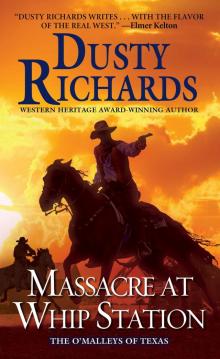 Massacre at Whip Station
Massacre at Whip Station Blue Roan Colt
Blue Roan Colt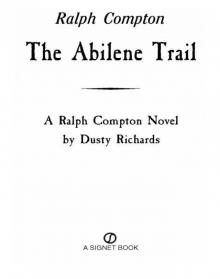 The Abilene Trail
The Abilene Trail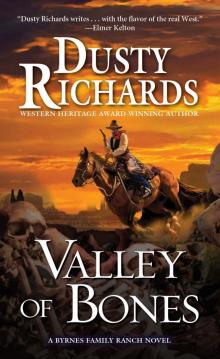 Valley of Bones
Valley of Bones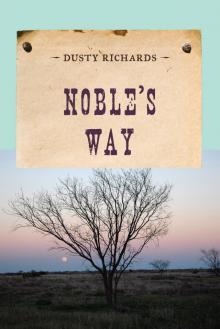 Noble's Way
Noble's Way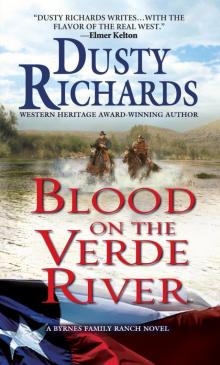 Blood on the Verde River
Blood on the Verde River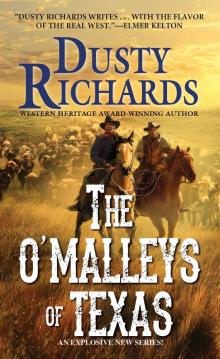 The O'Malleys of Texas
The O'Malleys of Texas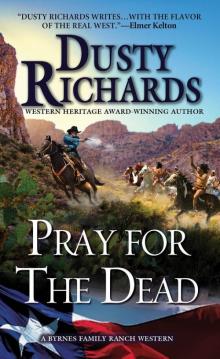 Pray for the Dead
Pray for the Dead Arizona Territory
Arizona Territory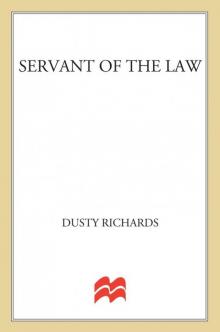 Servant of the Law
Servant of the Law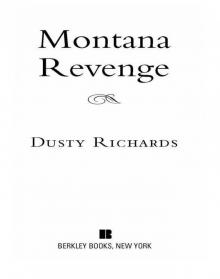 Montana Revenge
Montana Revenge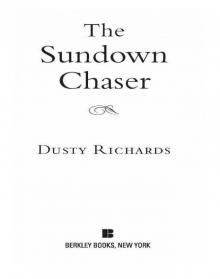 The Sundown Chaser
The Sundown Chaser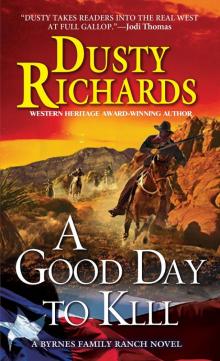 A Good Day To Kill
A Good Day To Kill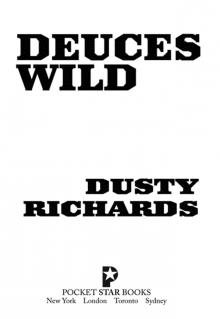 Deuces Wild
Deuces Wild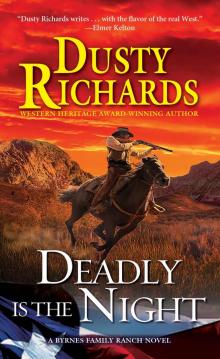 Deadly Is the Night
Deadly Is the Night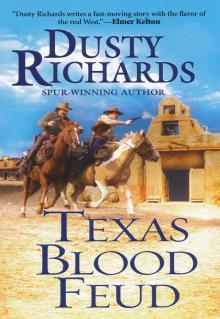 Texas Blood Feud
Texas Blood Feud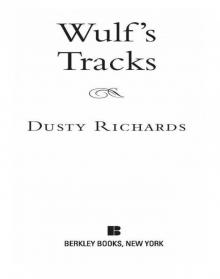 Wulf's Tracks
Wulf's Tracks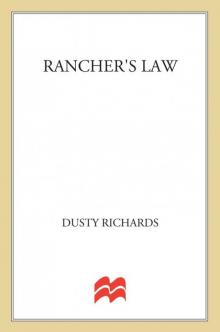 Rancher's Law
Rancher's Law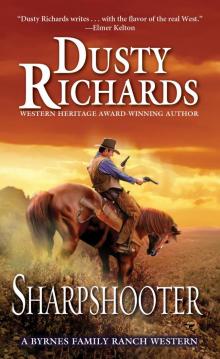 Sharpshooter
Sharpshooter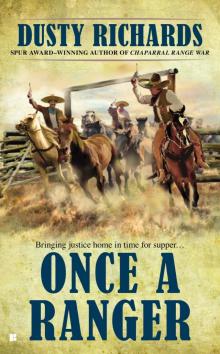 Once a Ranger
Once a Ranger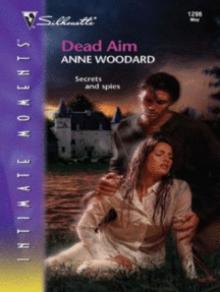 Dead Aim
Dead Aim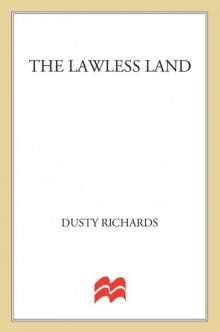 Lawless Land
Lawless Land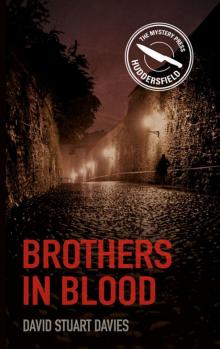 Brothers in Blood
Brothers in Blood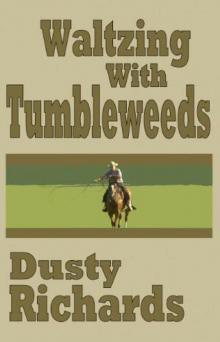 Waltzing With Tumbleweeds
Waltzing With Tumbleweeds